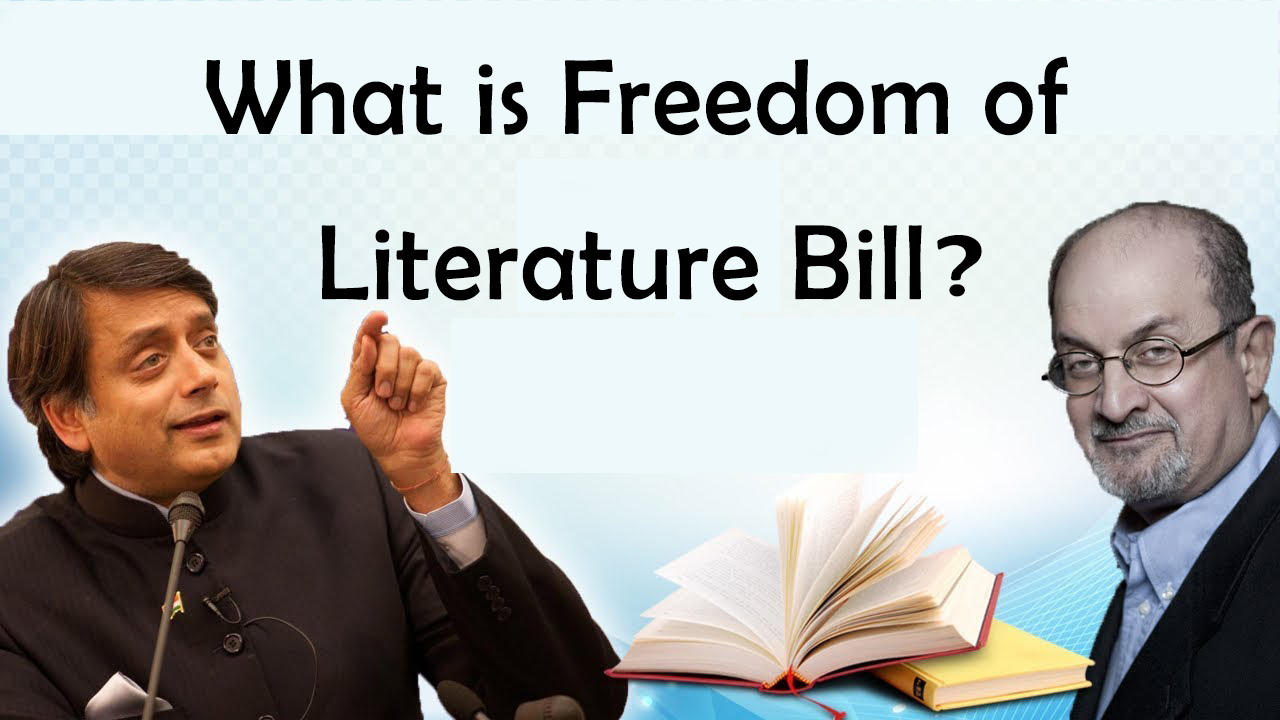Table of Contents

SO WHAT JUST HAPPENED?
Dr Shashi Tharoor MP introduced a private bill titled “Freedom of Literature Bill” _______________________________________ Private Member – Any MP who is not a Minister is referred to as a private member. Government Bills – Bills introduced by Ministers are referred to as government bills. They are backed by the government, and reflect its legislative agenda. Private member’s bills purpose is to draw the government’s attention to what individual MPs see as issues and gaps in the existing legal framework, which require legislative intervention.
A THING TO NOTE HERE
While government Bills can be introduced and discussed on any day, private member’s Bills can be introduced and discussed only on Fridays. Fourteen private member’s Bills — five of which were introduced in Rajya Sabha — have become law so far.
FREEDOM OF LITERATURE BILL
The Bill seeks to amend the provisions in the Indian Penal Code, Code of Criminal Procedure, Customs Act and the Indecent Representation of Women(Prohibition) Act which affect literary and artistic freedom.
SOME OF THE BANNED BOOKS IN INDIA
- The Satanic Verses by Salman Rushdie – Banned for allegedly being insulting to the Prophet.
- The Hindus: An Alternative History by Wendy Doniger – Banned for portraying Indian Gods in a humourous manner.
- Understanding Islam through Hadis by Ram Swarup – Banned for being harsh towards Islam
- The Ramayana as told by Aubrey Menen – Banned for satirising the Ramayana.
SOME OF THE BANNED BOOKS IN INDIA
- Lajja by Taslima Nasreen – Banned for hurting Muslim sentiments.
- The Polyester Prince: The Rise of Dhirubhai Ambani by Hamish McDonald Banned for tarnishing the Ambani family’s image.
HIGHLIGHTS OF THE BILL
- The Freedom of Literature Bill, 2018, puts on the government the onus of explaining why a book needs to be banned and removes the government’s right to ban books indefinitely.
- The Bill envisages reading down Section 295A of the Indian Penal Code that provides for imprisonment of up to three years for “deliberate and malicious acts intended to outrage religious feelings or any class by insulting its religion or religious beliefs,” as well as Section 298, which is similar to 295A as it criminalises speech critical of religious organisations or religious figures, and therefore a major deterrent to free expression. Mr. Tharoor cites the example of Wendy Doniger’s The Hindus: An Alternative History, which was banned in India because of legal travails under 295A.
HIGHLIGHTS OF THE BILL
- The most important part of the Bill, however, are the amendment to the Customs Act that allows governments to suspend the shipping in of books over an indefinite period (as had happened with the ban on Salman Rushdie’s Satanic Verses).
HIGHLIGHTS OF THE BILL
- Section 292 of the IPC which criminalizes the sale and distribution of obscene books, writings, paintings etc.
- As per this section, something is considered to be obscene if it “is lascivious or appeals to the prurient interest or if its effect, or (where it comprises two or more distinct items) the effect of any one of its items, is, if taken as a whole, such as to tend to deprave and corrupt person, who are likely, having regard to all relevant circumstances, to read, see or hear the matter contained or embodied in it.”
PROCEDURE TO BAN BOOKS
Under Section 95 of the CrPc, the State Government can ban and forfeit a book, if it appears to be in violation of S.153A, 153B (causing communal divisions), S. 292 (obscenity law), S. 295A (anti-blasphemy law), S. 124A (sedition). The Government can thus ban a book, if it “appears” to be in violation of the law, not necessarily an actual violation, it can exercise this power without seeking the confirmation of the Court that such violation exists.
FREEDOM OF EXPRESSION IN INDIA
The Constitution of India provides the right of freedom, given in articles 67, 45, 87 and 92 with the view of guaranteeing individual rights that were considered vital by the framers of the constitution. The right to freedom in Article 19 guarantees the Freedom of speech and expression, as one of its six freedoms

























 WhatsApp
WhatsApp